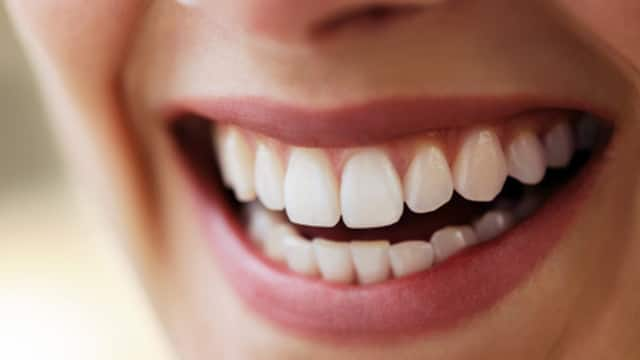The Main Ingredient
The results of a research study published on US National Library of Medicine, National Institutes of Health on evaluation of the clinical efficacy of potassium nitrate desensitising mouthwash and a toothpaste in the treatment of dentinal hypersensitivity found that both desensitising toothpaste and mouthwash are equally effective in reducing sensitivity. This compound is able to seep into the surface of the enamel of your teeth, reaching the nerves inside. The potassium nitrate then blocks the signals that the nerves in your teeth usually send to the brain to trigger discomfort. Although the active ingredient in toothpaste for sensitive teeth is effective, it usually takes several uses of the toothpaste before you can see and feel the difference.
Fluoride for Sensitive Teeth
Sensitive teeth toothpaste also contains fluoride, and although this well-known ingredient won't block the pain, it does help strengthen the enamel of the teeth, keeping strong foods from reaching the nerves. It has the added benefit of reducing your risk for cavities, too. Some toothpastes made for sensitive teeth contain higher levels of fluoride than regular toothpastes, and may therefore be more helpful depending on the level of sensitivity. Along with using a toothpaste that contains fluoride, you might also consider having your dentist apply fluoride gels or varnishes to your teeth during your semi-annual checkup to further strengthen your enamel.
Your Product Options
A variety of toothpastes for sensitive teeth are available today: Maximum-strength toothpastes for tooth sensitivity usually contain 5 per cent potassium nitrate, the greatest amount allowed by the Food and Drug Administration (FDA) in a non-prescription toothpaste. Although reducing sensitivity is the overall goal of a sensitive teeth toothpaste, it's not the only goal; these toothpastes also provide cavity and tooth decay protection, and help reduce tartar levels. Some products help whiten the teeth as well, using abrasives that are specially formulated to gently remove stains from the enamel's surface. Other toothpastes are designed to be less abrasive, reducing erosion in the tooth's enamel.
What Else You Can Do
Using a toothpaste made for sensitive teeth is just the beginning. The way you brush, what you eat and how well you care for your teeth all play a part in helping to reduce sensitivity. For example, brushing with too much vigour or force can lead to erosion of the enamel. Try to brush more gently, using a soft-bristled toothbrush. Be gentle when you brush around your gums, too, to reduce the chance of them pulling away and exposing the roots of your teeth.
Eating certain foods can also weaken the enamel of your teeth, making sensitivity more likely. Sugary foods increase your risk for tooth decay, but acidic foods increase your risk for erosion of the enamel and sensitive teeth. Sometimes, sugary foods are also acidic foods, such as fizzy drinks and juice. Acidic foods also include citrus fruits, pickles and apples – foods that are otherwise healthy.
One way to reduce your teeth's exposure to this acid is to use a straw when drinking, and drink a glass of water while eating. Although it's usually recommended that you brush right away after a meal, if you have a higher risk for enamel erosion, it's often a good idea to wait about an hour before brushing. Acidic foods soften your enamel, and toothbrushing too soon after eating can abrade it further.
Your dentist can provide further assistance when it comes to treating your sensitive teeth. They can advise you on how long to use the toothpaste and what to do if it doesn't provide the relief you're after.
This article is intended to promote understanding of and knowledge about general oral health topics. It is not intended to be a substitute for professional advice, diagnosis or treatment. Always seek the advice of your dentist or other qualified healthcare provider with any questions you may have regarding a medical condition or treatment.
ORAL HEALTH QUIZ
What's behind your smile?
Take our Oral Health assessment to get the most from your oral care routine
ORAL HEALTH QUIZ
What's behind your smile?
Take our Oral Health assessment to get the most from your oral care routine











